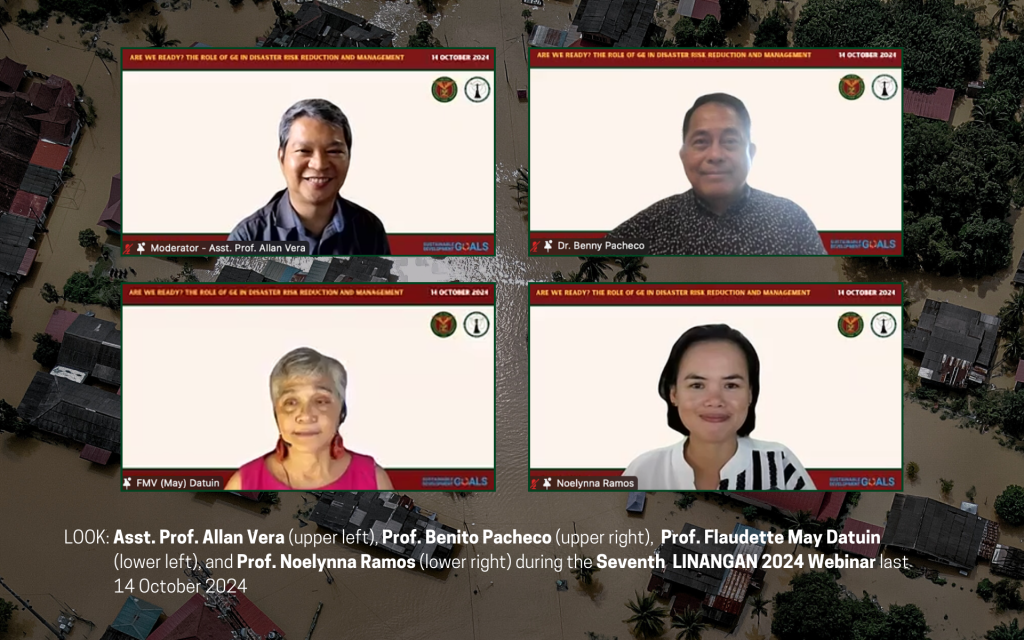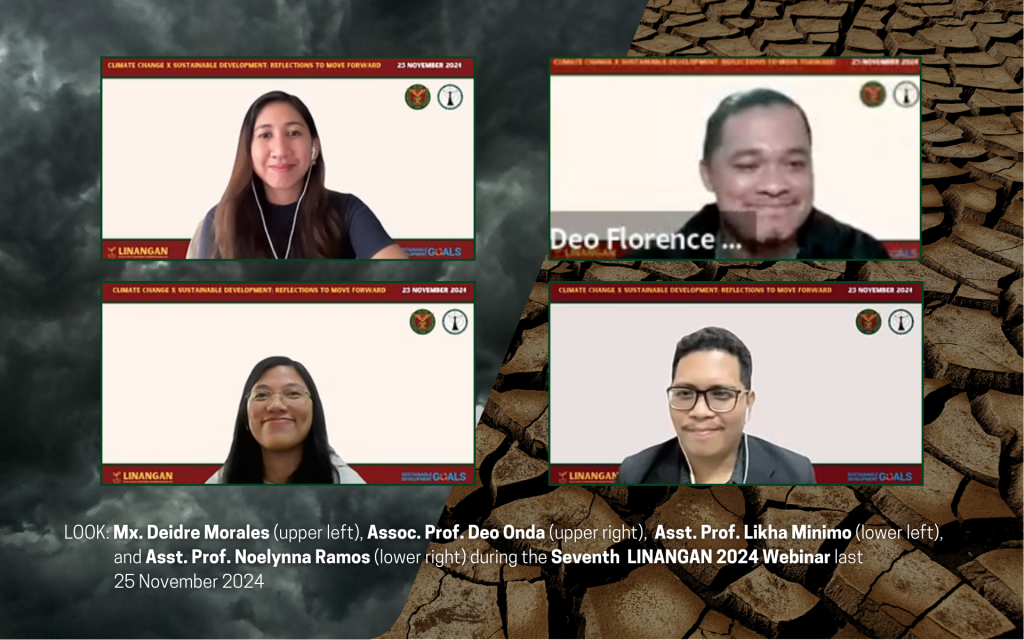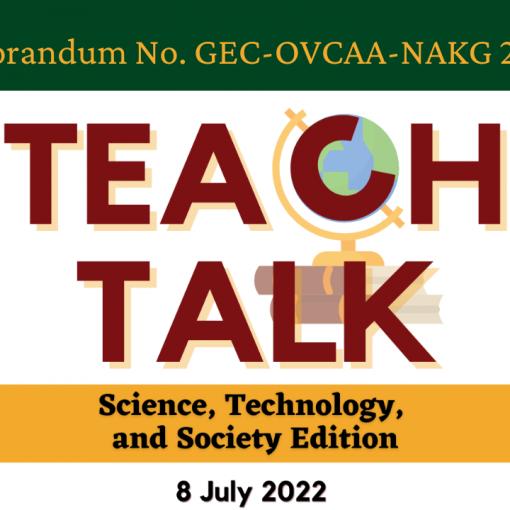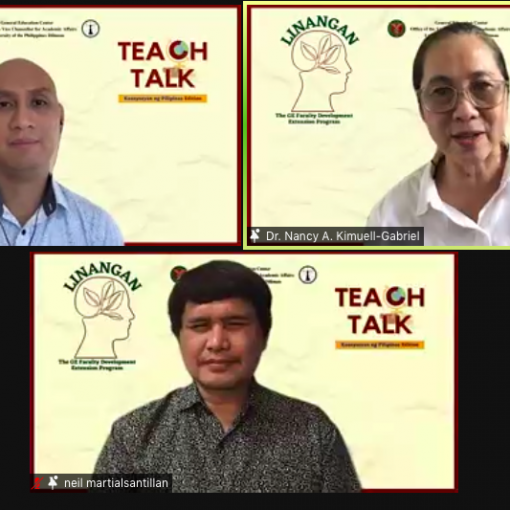

In celebration of the International Day for Disaster Risk Reduction (IDDRR) observed annually every 13th of October, the two most recently concluded LINANGAN sessions facilitated by the General Education Center (GEC) centered on disaster preparedness and risk reduction. Both sessions explored the pedagogies of selected GE courses and their crucial role in facilitating awareness among students and to the wider public about disaster risk mitigation, adaptation, and preparedness. Additionally, the sessions underscored how the featured GE courses can be an example of the potential of GE courses in general in promoting consciousness about climate change issues and sustainable development practices.
The first session, titled “Are We Ready? The Role of GE in Disaster Preparedness and Risk Reduction” and held on October 14, 2024, focused on the pedagogy of GE courses DRMAPS: Disaster Risk Mitigation, Adaptation, and Preparedness Strategies and Geol 1: Our Dynamic Earth.
Professor Emeritus Benito Pacheco from the UP Institute of Civil Engineering, College of Engineering delivered his opening remarks, wherein he shed light on the distinction between risk and disaster and highlighted the roles of government agencies involved in disaster prevention, preparedness, response, and early recovery. Dr. Pacheco emphasized the importance of educators having both a willingness to teach and taking on a proactive approach to acquiring knowledge, skills, and in-depth understanding of the interplay among all risk factors.
The opening remarks were immediately followed by the talk of Prof. Flaudette May Datuin from the Department of Art Studies, College of Arts and Letters. Dr. Datuin featured the pedagogy of DRMAPS, briefly going through the history of the development and conceptualization of the course. She noted in her discussion best practices and resources she uses in teaching the course, highlighting the use of three different lenses– psychosocial, sociopolitical, and ecocritical– in introducing and tackling the concepts to her students.
The latter half of the session featured the discussion of Prof. Noelynna T. Ramos from National Institute of Geological Services, College of Science wherein she shared teaching strategies, learning tools, and assessment tools she utilizes in teaching Geol 1. In her discussion of the various common hazards experienced in the country, she underscored the importance of incorporating disaster risk and reduction concepts in GE courses to foster hazard preparedness and risk prevention.
Following the conclusion of the two discussions, an open forum session took place which was moderated by Asst. Professor Cesar Allan Vera from the Department of Community Development, College of Social Work and Community Development. Majority of the questions were centered on what strategies to employ in order to mobilize and engage with Gen Z students and how to incorporate DRRM concepts in other GE courses such as Math and Art Studies. The discussion emphasized the importance of encouraging students to participate in field activities and step out of their digital comfort zones. A key takeaway as well is the inherent interdisciplinary and interlinking nature of GE courses, which allows a seamless incorporation of DRMM concepts in discussions.
The second and last session of LINANGAN for disaster risk management, titled “Climate Change x Sustainable Development: Reflections to Move Forward,” was held on November 25, 2024 and featured discussions on the pedagogies of STS 1: Science, Technology, and Society and Geog 1: Places and Landscapes in a Changing World.
The program kicked off with welcoming remarks from Assoc. Prof. Deo Florence Onda from the Marine Science Institute, College of Science. Dr. Onda emphasized the pressing realities of climate change, noting that it is a multifaceted and interconnected global issue that transcends mere statistics, instead representing a lived experience for many individuals affected by it.
The first half of the session featured a presentation by Asst. Professor Likha Minimo from the Science and Society Program, College of Science wherein she highlighted the topics covered in the syllabus. Dr. Minimo also included in her discussion definitions and distinction among key DRRM concepts in relation to disaster events in our country’s history, alongside practical resources and applications that could significantly help facilitate more awareness about DRMM and climate change even outside the classroom setting.
The subsequent part of the session was covered by Asst. Professor. Fernand Francis Hermoso from the Department of Geography, College of Social Sciences and Philosophy wherein he provided a brief overview of the history of the development of Geog 1 and shared his methods for teaching and assessing the course. He incorporated in his discussion the three components of sustainability as well as the SDGs to shed light on the complex interplay between the three components to achieve true sustainability.
An open forum moderated by Ms. Deidre Morales from Departamento ng Filipino at Panitikan ng Pilipinas, College of Arts and Letters took place after the conclusion of presentations. Majority of the participants raised questions about possible ways to incorporate AI on addressing issues on sustainability and climate change. A keypoint raised from the discussion includes the potential of AI in different fields, such as in generating predictive forecast images and machine-controlled emissions, but cautioned overreliance as it may compromise one’s capacity to critically think and do research. The discussion also underscored the importance of aligning the syllabi with current social issues to ensure that the curriculum remains relevant, responsive, and adaptable.
The last session for this cycle of LINANGAN will be held in February 2025. Interested participants may register for this upcoming session through this link. Meanwhile, individuals may rewatch the recorded livestream of previous LINANGAN sessions via GEC’s YouTube channel.




